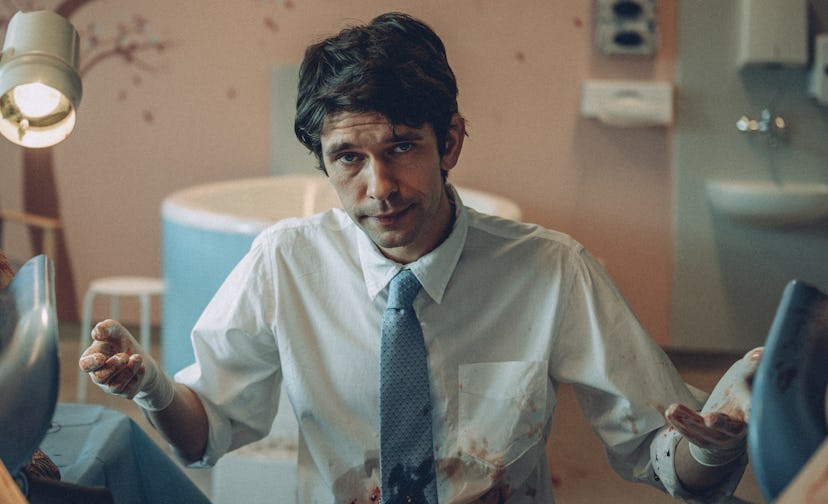Welcome to W TV Club, in which W magazine chooses a television show they’d recommend you binge-watch. This week, writer Michel Ghanem, aka @tvscholar, recommends This Is Going To Hurt, a uniquely realistic and empathetic medical drama airing on BBC and AMC.
If it feels like television has covered all possible angles of the medical procedural, that’s because it has: ER and Grey’s Anatomy have cemented themselves as long-running ensemble dramas for over two decades. Comedy found its way into the hospital on Getting On and Scrubs. The protagonist-focused series Nurse Jackie and House probed the insidious opioid addictions amongst medical professionals. And still today, the torch keeps burning on series like The Good Doctor, New Amsterdam and The Resident as they rehash and reignite the original serialized format, often with uneven results. Each of these series largely extract the exciting, adrenaline-pumping aspects of medical care, but the new high-octane medical series This Is Going to Hurt reminds me of the earlier seasons of ER—stripped of glitz and focused on peeling back new layers of realistic portrayal, it’s a viewing experience that will leave you heartbroken, but with more empathy than ever for medical professionals running on fumes.
This Is Going to Hurt, as the title suggests, is a gut-wrenching medical series, and possibly the most realistic portrayal of a broken medical system currently airing on television. Adapted from a memoir and international bestseller of the same name by Adam Kay, who also writes the series, This Is Going to Hurt follows a brilliant Ben Wishaw as Adam, a junior doctor on a labor ward, and one of the few gay doctor protagonists on screen, if not the first gay male doctor protagonist leading a television series. Wishaw toes the line between the dramatic and comedic tones of the series with precision; fans of Fleabag will appreciate his breaking of the fourth wall to address the viewer directly during moments of medical crisis.
The seven-episode season takes place during 2006—years before a pandemic would stretch healthcare centers around the world to a new breaking point, but at a time when an under-funded, crumbling system was already having a profound impact on its exhausted medical staff. While most medical shows will invest considerable screen time for the sob stories of their patients, This Is Going to Hurt is self-aware enough to know that in reality, doctors barely have time to exchange a few words with hospital patients on an average work day as they run from crisis to crisis.
The strength of This Is Going to Hurt lies in its realistic depictions of medical predicaments: the series has little-to-no beauty lighting, baby deliveries are gruesome and graphic, nurses keep the hospitals running, and care has been invested in details overlooked by the average medical drama on television. In one scene, Adam performs an emergency C-section on a patient in critical condition, and swiftly turns to the camera to give us details that might otherwise get lost in medical babble—the incision won’t bleed because the patient’s heart is no longer pumping, he tells us gently.
But in addition to its critical examination of a public health system, the series also uses comedy to great effect. Adam’s dark-humored quips to the viewer about patients and his distaste for the hospital’s leadership later serve to reinforce his compartmentalization as a traumatized doctor trying to prove his worth under the impossible strain of the system. Wishaw’s radiant performance truly comes to life in the push-and-pull between his crumbling relationship at home and the pressure he faces at the hospital, which he never seems to be able to leave—at one point, he quite literally falls asleep at the wheel in the hospital’s parking lot after his shift, only to wake up to the next work day.
Special attention should also be paid to newcomer Ambika Mod, who gives a breakout performance as Shruti Acharya, a student doctor working with Adam. She buckles under the pressure of the demands between 90-hour work weeks and non-stop studying for qualifying exams. While the plucky interns on Grey’s Anatomy run around hungrily from surgery to surgery in disbelief at their luck, Shruti is mostly frazzled and exhausted, the bags under her eyes visible and the relentlessness of the job palpable. She is already at her breaking point, and she has barely begun her career. A doctor on another series might spend an entire episode with one patient, but here Acharya is assigned 100, and by the time she gets to the last few, she can barely summon the empathy required to deliver heartbreaking bad news to an expecting mother.
Already airing in the U.K on BBC, This Is Going To Hurt is co-produced with AMC and will soon stream in the U.S. this spring. If the early reviews are any indication, it may be one of the most emotionally moving series to hit the streamers this year. Medical professionals rarely warn of imminent pain before an injection—they would rather distract you with a shiny thought or question. This Is Going to Hurt does not distract. It may be an unglamorous addition to the medical procedural canon, but it is ultimately a dose of truthful and realistic medicine, and one you won't be forgetting any time soon.
This article was originally published on
